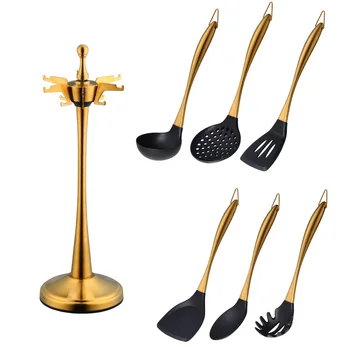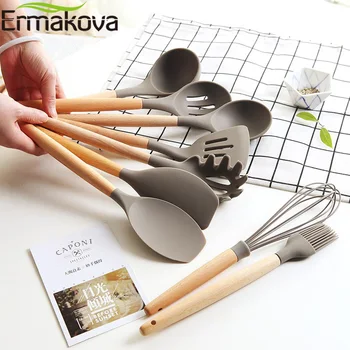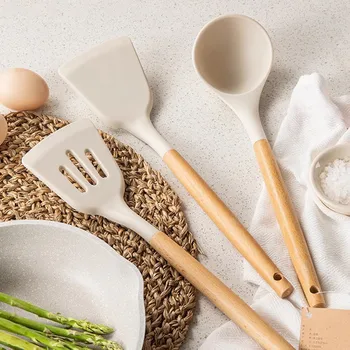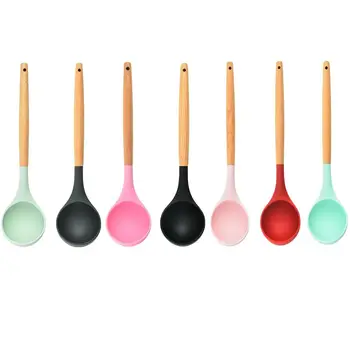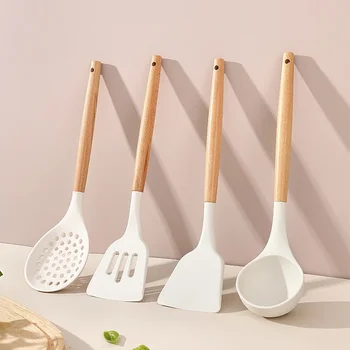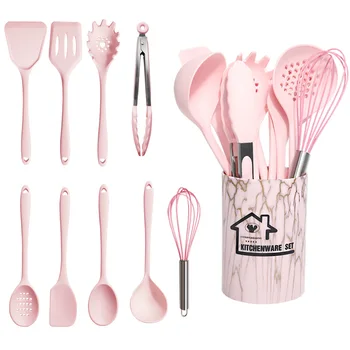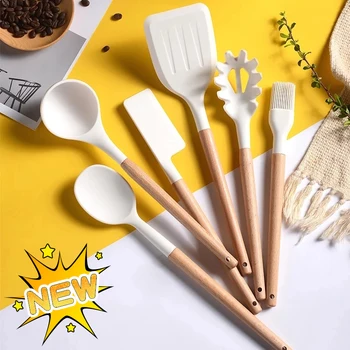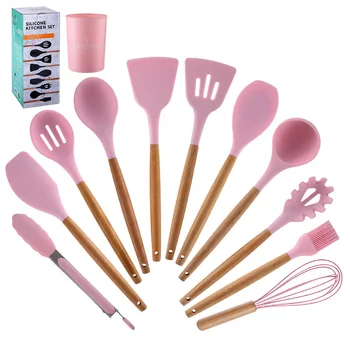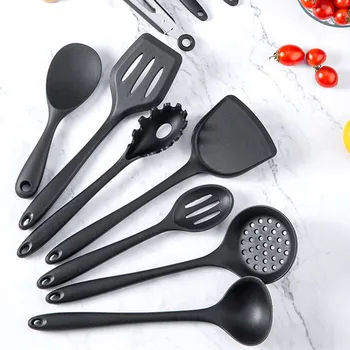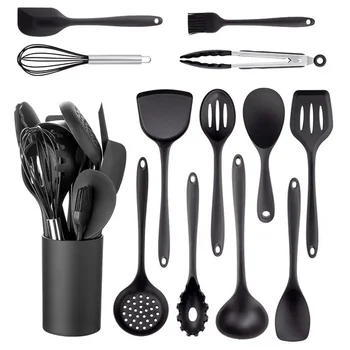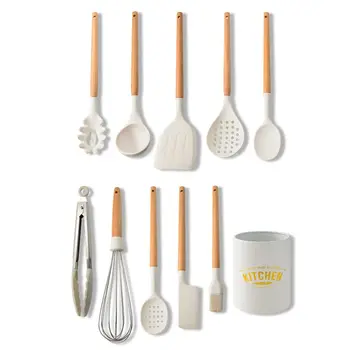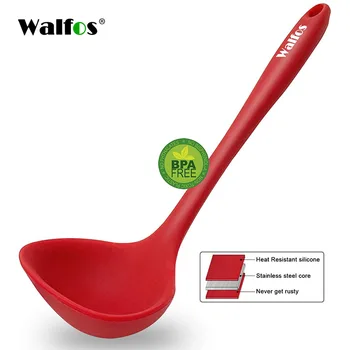Nonstick kitchen utensils
Cook your favorite dishes without damaging your nonstick cookware with these nonstick cookware. Non-stick cookware is specially designed to avoid scratching your pots and pans, check out the variety we have available!
- Sale!
 Out of stock
Kitchen Utensils
Out of stock
Kitchen Utensils1-7PCS Silicone Head Kitchenware Stainless Steel Handle Soup Ladle Colander Cooking Set Turner Serving Spoon Kitchen Tool
Rated 0 out of 5$24.00 – $121.00 Select options This product has multiple variants. The options may be chosen on the product page - Sale!
 Out of stock
Kitchen Utensils
Out of stock
Kitchen UtensilsSilicone Cooking Utensils Wooden Handle Non-Stick Spatula Spoon Turner Soup Ladle Whisk Kitchen Cooking Tools Gadget
Rated 0 out of 5$15.00Original price was: $15.00.$14.00Current price is: $14.00. Select options This product has multiple variants. The options may be chosen on the product page - Sale!
 Out of stock
Kitchen Utensils
Out of stock
Kitchen UtensilsKitchen Utensils Non-Stick Wooden Handle Silicone Cooking Tools Spatula Shovel Spoon Cookware Gadget for Kitchen Accessories
Rated 0 out of 5$44.00Original price was: $44.00.$14.00Current price is: $14.00. Select options This product has multiple variants. The options may be chosen on the product page - Sale!
 Out of stock
Kitchen Utensils
Out of stock
Kitchen UtensilsMulti-purpose Silicone Large Stirring Spoon Heat Resistant Soup Ladle Long Wood Handle Serving Spoon for Kitchen Utensils
Rated 0 out of 5$40.00Original price was: $40.00.$14.00Current price is: $14.00. Select options This product has multiple variants. The options may be chosen on the product page - Sale!
 Out of stock
Kitchen Utensils
Out of stock
Kitchen Utensils4Pcs/Set Silicone Kitchen Utensils Set Turner Cooking Tools Ladle For Kitchen Skimmer Non-stick Cookware Kit Kitchen Accessories
Rated 0 out of 5$77.00Original price was: $77.00.$25.00Current price is: $25.00. Select options This product has multiple variants. The options may be chosen on the product page - Sale!
 Out of stock
Kitchen Utensils
Out of stock
Kitchen Utensils10Pcs Pink Silicone Cooking Utensils Set Non-Stick Pan Baking Tools Kitchenware Spatula Spoon Food Tongs Kitchen Kit with Box
Rated 0 out of 5$52.00 Select options This product has multiple variants. The options may be chosen on the product page - Sale!
 Out of stock
Kitchen Utensils
Out of stock
Kitchen UtensilsSilicone Kitchenware Wooden Handle Non-Stick Spatula Heat Resistant Cooking Tool Ladle Egg Beaters Kitchen Cookware Accessories
Rated 0 out of 5$14.00 – $15.00 Select options This product has multiple variants. The options may be chosen on the product page - Kitchen Utensils
Pink Cooking Kitchenware Tool Silicone Utensils with Wooden Multifunction Handle Non-Stick Spatula Ladle Egg Beaters Shovel
Rated 0 out of 5$14.00 Select options This product has multiple variants. The options may be chosen on the product page - Sale!
 Out of stock
Kitchen Utensils
Out of stock
Kitchen UtensilsBlack Silicone Cooking Utensils Set Kitchenware Non-Stick Cookware Spatula Ladle Egg Beaters Shovel Kitchen Tools Accessories
Rated 0 out of 5$35.00Original price was: $35.00.$14.00Current price is: $14.00. Select options This product has multiple variants. The options may be chosen on the product page - Sale!
 Out of stock
Kitchen Utensils
Out of stock
Kitchen UtensilsSilicone Cooking Utensils Non-stick Kitchenware Tools Spatula Ladle Egg Beaters Shovel Soup Butter Scraper Kitchen Cookware
Rated 0 out of 5$14.00 – $68.00 Select options This product has multiple variants. The options may be chosen on the product page - Sale!
 Out of stock
Kitchen Utensils
Out of stock
Kitchen UtensilsWhite Cooking Kitchenware Tool Silicone Utensils With Wooden Multifunction Handle Non-Stick Spatula Ladle Egg Beaters Shovel
Rated 0 out of 5$14.00 – $19.00 Select options This product has multiple variants. The options may be chosen on the product page - Sale!
 Out of stock
Kitchen Utensils
Out of stock
Kitchen UtensilsWALFOS Cake Butter Spatula Silicone Spoon Mixing Spoon Long-Handled Cooking Utensils Tableware Kitchen Soup Spoons Mixer Cooking
Rated 0 out of 5$14.00 Select options This product has multiple variants. The options may be chosen on the product page
Nonstick cookware is highly favored for its convenience in both cooking and cleaning. Its flawlessly smooth and slick surface allows for the effortless creation of perfectly cooked eggs, pancakes, and crepes, significantly reducing the need for excessive butter or oil to prevent sticking.
To extend the life of your nonstick cookware, it’s essential to treat it with care. This includes avoiding the use of nonstick cooking sprays and refraining from leaving acidic foods in the pan for extended periods, as these practices can harm or discolor the nonstick surface. Equally critical is the avoidance of metal utensils during cooking to prevent scratching or damaging the coating. Below are three types of utensils that are perfectly suited for use with nonstick cookware:
Types of Nonstick cookware
Silicone
Silicone utensils are exceptionally kind to nonstick surfaces and are capable of withstanding high temperatures without damage. While they excel in many cooking tasks, flipping larger cuts of meat like hamburgers or steaks might present a challenge.
It’s also worth noting that silicone utensils can be susceptible to damage from sharp objects, so care should be taken during use. Despite these considerations, their combination of durability, flexibility, and ease of cleaning positions silicone utensils as a favored option for those who frequently use nonstick cookware.
Wood
Wooden utensils are an excellent choice for nonstick pans due to their inability to scratch the surface, preserving the integrity of the cookware. When properly maintained—such as avoiding dishwasher cleaning—quality wooden utensils can last for decades.
They offer robustness ideal for stirring and mixing. However, their design is not optimal for flipping tasks, such as turning over fish, which may require a more specialized tool.
Nylon
Nylon utensils share the non-damaging qualities of wooden and silicone utensils, making them another excellent choice for preserving the integrity of nonstick coatings. They are exceptionally durable and robust, well-suited for a variety of kitchen tasks, including mixing and flipping.
However, nylon has its downsides; food particles can adhere to it more readily, complicating cleanup—though they are dishwasher safe, which mitigates this issue. Caution is advised when using nylon utensils near high heat, as they are susceptible to melting.
NEWSLETTER
get discount coupons
Subscribe to our newsletter to receive the best offers.

